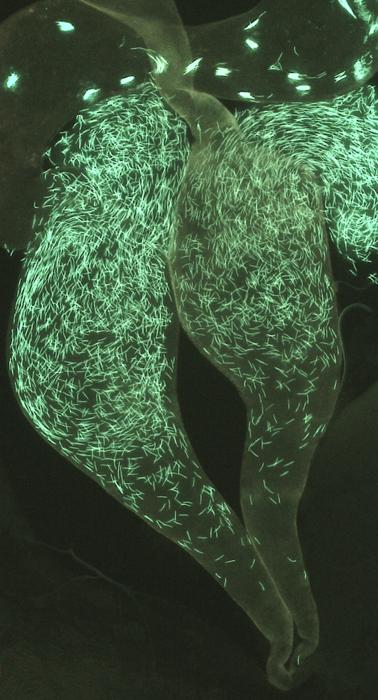
As males age, it is generally known that their reproductive success tends to decline, a phenomenon commonly referred to as reproductive senescence. However, a recent groundbreaking study conducted by researchers from the University of Oxford presents a new perspective on this widely accepted notion. While older males of the fruit fly species Drosophila melanogaster typically produce fewer offspring than their younger counterparts, this decline cannot be attributed to a reduction in sperm count. Instead, the researchers found that the real culprit lies in the limitations imposed by seminal fluid.
The study brilliantly uncovers the complexities of male fertility and the pivotal role that seminal fluid plays in reproductive success. Researchers embarked on a thorough investigation into the mating behaviors of fruit flies. They meticulously tracked the reproductive output of both young and old males, discovering an unexpected trend: older males accumulated more sperm over time. Contrary to initial assumptions about aging leading to diminished sperm production, these older males had a higher quantity of sperm during mating, yet they faced a drastic decline in their reproductive success.
One striking observation made by the researchers was that females displayed an inclination to store fewer sperm from older males, which in turn directly impacted the number of offspring produced. This revelation leads to a critical question: why do females opt to retain less sperm from older males? The team posits two possible explanations: it could be a result of females actively ejecting a higher proportion of sperm post-mating or perhaps due to the deterioration in the quality of seminal fluid produced by older males.
Seminal fluid, a non-sperm component of the ejaculate, is crucial for ensuring successful fertilization, sperm storage, and, ultimately, egg laying. The study illustrates the importance of ejaculate quality and how it can significantly influence male fertility. This relation becomes even more pronounced in species characterized by polygamous mating systems, where males have the chance to mate with multiple partners. In such contexts, the energetic cost of ejaculate production becomes a vital factor that shapes reproductive strategies.
To delve deeper into the factors limiting the reproductive success of older males, researchers conducted experiments supplementing the females’ diets with seminal fluid from younger males, distinctly isolating seminal fluid from sperm. This innovative approach revealed fascinating results: the supplementation effectively restored the reproductive output of older males to levels comparable to those of their younger counterparts. Notably, this finding underscores a critical aspect of polygamous mating dynamics; the seminal fluid from prior mates can enhance the reproductive capabilities of subsequent males.
The implications of this research extend far beyond fruit flies. The findings draw attention to the nuanced interplay between sperm and seminal fluid, elucidating how the quality and quantity of these components contribute to reproductive success. This research could have profound ramifications in the fields of animal husbandry and In Vitro Fertilization (IVF), as understanding these dynamics may lead to improved fertility strategies and treatments.
Dr. Krish Sanghvi, the lead author from Oxford’s Department of Biology, emphasized the significance of their findings, stating that the deterioration of seminal fluid quality is a primary factor driving the observed decline in reproductive output among older males. This research challenges traditional notions surrounding male fertility and suggests that mitigating the effects of aging on reproductive success may be feasible by focusing more on the quality of seminal fluid rather than merely the quantity of sperm.
The study also offers critical insights into sexual selection and the ongoing conflict between male and female reproductive strategies. It highlights the fact that female fitness is shaped not only by the male’s age or mating history but also by the interactions occurring during mating. An important takeaway from this research is that declines in male reproductive output are not necessarily permanent; with adequate supplementation of quality seminal fluid, older males can regain their fertility potential.
Looking ahead, Dr. Sanghvi indicated that future studies could further examine whether the effects of age on seminal fluid quality correlate with male fertility. Furthermore, exploring how female mechanisms of sperm ejection vary could provide deeper insights into the strategies that maximize reproductive success in different mating scenarios.
This pioneering research thus sheds light on an underappreciated aspect of male fertility dynamics, emphasizing that reproductive success hinges on a delicate balance between sperm quantity and seminal fluid quality. These findings are crucial not only for understanding fertility challenges across species but may also hold implications for improving fertility treatments in humans as well.
In summary, the age-related decline in male reproductive success is intricately tied to the quality of seminal fluid rather than simply the number of sperm produced. The recent groundbreaking study from the University of Oxford challenges conventional beliefs and opens new avenues for understanding male fertility. Such insights are not only pivotal for evolutionary biology but may also provide critical knowledge for advancing reproductive technologies in various fields.
Subject of Research: Male Fertility and Seminal Fluid Quality in Drosophila melanogaster
Article Title: Reproductive output of old males is limited by seminal fluid, not sperm number
News Publication Date: October 2023
Web References: University of Oxford Biology Department
References: DOI: 10.1093/evlett/qrae071
Image Credits: Krish Sanghvi
Keywords: Male Fertility, Seminal Fluid, Drosophila melanogaster, Reproductive Aging, Polygamous Mating, IVF
Tags: Drosophila melanogasterEjaculate QualityFemale Sperm EjectionFertility RestorationIVFMale FertilityPolygamous MatingReproductive AgingReproductive SenescenceSeminal FluidSeminal Fluid SupplementationSperm Storage





